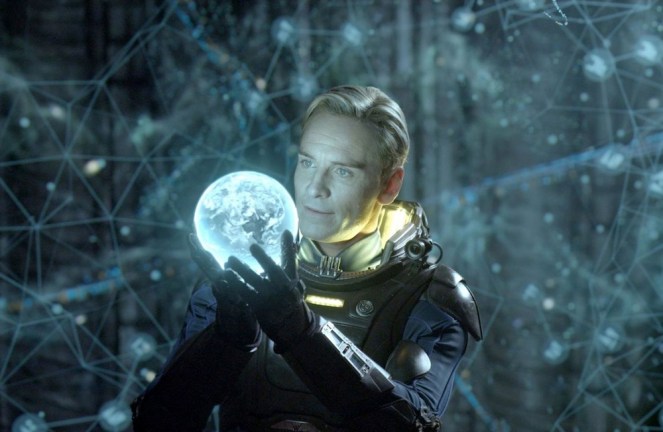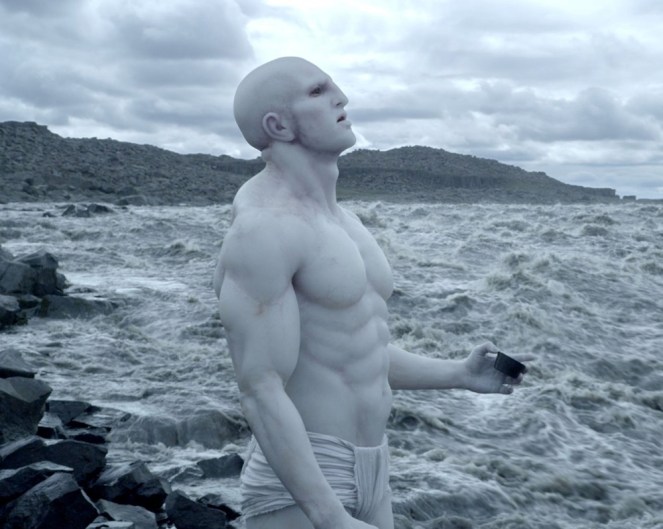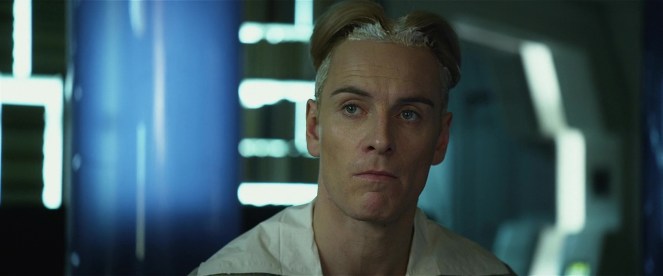As part of my occasional series on mystical and gnostic themes in film, I thought it would be a good time to tackle Prometheus, what with Alien: Covenant in cinemas as I write this. Prometheus is part of the franchise that began in 1979 with Alien, the classic horror film directed by Ridley Scott, and is a prequel to the entire series. Some criticised the film for being too philosophical and not living up to the terrors of Alien, but Prometheus was never meant to be just another monster movie.

Prometheus is based on the popular theory that life on Earth was seeded by aliens and/or that our evolution has been influenced by an advanced, ancient civilisation. The film explores the origins of life, the process and ethics of creation and destruction, and what it means to be human. It asks some big questions (but doesn’t answer them) and mixes that up with lots of running around, screaming and gory mayhem.
But it can also be seen as a gnostic creation myth and an alchemical quest for perfection.
The film is named after the Titan who stole fire from the gods. There are various versions of the story, but Prometheus created mankind from clay and stole fire from the gods to give to humanity. He was a bit of a rebel and preferred humans to the Olympians. Zeus wasn’t pleased and chained Prometheus to a rock to be menaced by an eagle. Zeus also sent Pandora to Prometheus’ brother, Epimetheus, with a jar containing all the evils and diseases that cause death, as well as hope. It didn’t end well.
Remember Pandora’s jar – we’ll be seeing it again later. Meanwhile, let’s get into the story and explore some of the symbolism in the film. If you haven’t seen it, be warned: there are MASSIVE SPOILERS ahead…

While the earlier films in the franchise follow the structure of an Overcoming the Monster story (one of the seven basic plots found in storytelling), Prometheus is more of a Quest. There’s still a monster to be overcome, but the shape of the story is more about seeking answers. Quest stories usually include a call to adventure and a journey, which often involves a descent into the underworld and many tests and ordeals before the hero can escape death and win the treasure or get his answers.
The protagonist in Prometheus is scientist Elizabeth Shaw who believes mankind was created by a race of aliens she calls Engineers. Interestingly, she also has a strong faith in God. The call to adventure comes when she finds a pictogram in a prehistoric cave on the Isle of Skye in Scotland which shows people worshiping a giant being who points at a cluster of stars. She’s convinced the aliens are inviting us to pay them a visit, so with fellow scientist, her lover Charlie Holloway, she embarks on a quest to find the Engineers.
With financial backing from billionaire Peter Weyland, Shaw journeys to the location in the star map: LV-223, along with the crew of the Prometheus. On board the ship are various characters destined to die horrible deaths, plus David, an android created by Peter Weyland. It’s David’s antics that provide most of the tests and ordeals that Shaw faces on her descent, but it’s also David who helps her to escape in the end…

Prometheus begins flying over an expansive primordial landscape to a haunting soundtrack. A robed figure stands at the top of a powerful waterfall, over which hovers a spaceship. The figure opens a canister with geometric designs on the lid and inside is a cup filled with a gloopy black substance that bubbles. He drinks it and his body starts to dissolve, right down to the molecular level. He falls into the water and his DNA breaks apart, seeding the planet with life.
This is a ritual sacrifice, the killing of a divine king in order to ensure the fertility of the earth. In this case, his body literally becomes the life of the planet, as in many ancient creation myths where a god or goddess is dismembered and turned into the earth, such as Tiamat (remember her, we’ll come back to her later).
So the first thing we see tells us this is a story about the origins of life and how death seeds life through rebirth. The black gloop reminded me of a pomegranate, seen by some as the ‘forbidden fruit’ of the Tree of Knowledge. In Ancient Greece it was known as the ‘fruit of the dead’ and was also a symbol of fertility. Pomegranate seeds were eaten by Persephone when she was abducted and taken to the Underworld by Hades, which meant she was stuck down there for part of each year. This means that only through death can life be renewed.

In the film, it marks the beginning of the alchemical quest for the elixir of immortality or gnosis. This involves a process of purification and perfection of your being so you can become one with God or Life. The alien figure, an Engineer, undergoes an initiation and descent into matter, a fallen god entering incarnation who will then have to evolve his way back up again. This is reinforced by a deleted scene that shows a group of Elders who speak to the sacrificial figure before he drinks from the cup, saying:
“Let your body become the dirt. Your blood become the waters. And may your soul become their way back to us.”
This act of sacrifice forms part of a gnostic creation myth and not necessarily the beginning of one. The gnostic world contains multiple layers of reality, and multiple versions of every story, beings creating beings creating beings, like an endless fractal loop of creation. The basics go like this:
God descends through various emanations called aeons within the pleroma (cosmos). These aeons come in complementary pairs called syzygies, often as male and female. One of these aeons is Sophia (wisdom) and she has a great desire to understand the mystery of God, but in attempting to do so, accidentally creates the demiurge. The demiurge is ignorant of his true nature and thinks he’s God, so he creates the material world and servants to help run it, called archons.
In some versions it’s the archons who create human beings, in others, it’s the demiurge, but either way, a spark of the divine spirit (Sophia) is trapped inside each human soul. The goal of mankind then is to achieve gnosis, or knowledge of the truth of your essential oneness with God (or whatever you want to call it).
So the Engineers in Prometheus appear to be archons, servants of the demiurge, which tells us straight away that Shaw’s quest is bound to fail. She’s not going to find God at LV-223. But what does she find?
Monsters!

Interestingly, the demiurge is often depicted as a serpent with a lion’s head. He’s a monstrous figure that guards the boundaries of this world, perhaps to keep us from discovering the truth, but also perhaps to shield the unprepared from premature enlightenment. Awakening has to be earned through a confrontation with the darkness, and that’s not for the faint of heart.
If you’ve seen any of the Alien movies, you’ll know how terrifying this darkness can get. The Xenomorph and assorted alien beasties are creatures of chaos, like the ones born of Tiamat, the Babylonian goddess of primordial creation. She represents chaos and wages war against the younger gods by giving birth to 11 monsters: Venomous Snake, Great Dragon, Exalted Serpent, Furious Snake, Big Weather Beast, Mad Lion, Scorpion Man, Violent Storms, Fish Man, Bull Man, and (my favourite) the Hairy One.
It’s not just the serpents and snakes that are relevant here, but the Big Weather Beast and Violent Storms play a role too. The weather always acts up at crucial moments in these films, and Prometheus is no exception. (It happens again in Alien: Covenant.) The forces of nature are unleashed and man must do battle to survive.
So the alien monsters represent the forces of chaos, the deep, instinctual part of your being that pulls you back into unconsciousness and death. This is the darkest part of the shadow, teeming with chthonic gods and primordial drives, the abyss of dissolution and the desire to regress and return to the womb.
Becoming conscious is painful so the temptation to escape and refuse the challenge of evolution is always present. But it’s equally dangerous to repress these instinctual forces and deny them outright. When you believe you’ve overcome the darkness, conquered nature and become rational, a god and master of the world, you’re asking for trouble.
The more you think you’re in control, the more likely you are to unleash a backlash from the unconscious. It’s an overgrown ego that sets these monsters loose. The glare from the light of your own hubris prevents you from seeing how you’re being driven by the unconscious. Maybe that’s why so many of the characters in these films make stupid decisions that end up getting everybody killed.
The main action of Prometheus is set in motion by the hubris of Peter Weyland. Here he is (played by the awesome Guy Pearce) announcing his intentions in a TED Talk from 2023. This isn’t part of the film, but was released as an extra:
He clearly identifies with Prometheus, and it’s safe to say it doesn’t end well for him either…
Let’s get back to the film. The crew of the Prometheus, a scientific exploration vessel, are about to arrive at their destination. A lone figure wanders the corridors of the ship while the crew sleep in cryostasis. This is my favourite bit of the film: David pootling about the spaceship, playing basketball and watching movies, and um, doing his roots…?

David was created by Weyland, and as an android, he’ll never age, never break down, and never die. David is super intelligent and constantly learning, and obsessed with Lawrence of Arabia. He’s androgynous and vane and the most interesting character in the film. His motives are opaque and ambiguous, and he acts as a kind of trickster figure in the story, setting events in motion with unpredictable consequences.
In symbolic terms, David is a golem: a being that doesn’t appear to have any freewill of its own and can only do its creator’s bidding. But he also appears to share many of his makers’ faults and quirks. Does David like Lawrence of Arabia because he was programmed that way, or has he developed admiration for the character because Peter Weyland felt that way? Lawrence was passionate but kind of heartless, and that’s what David admires because he thinks the soulless quality of Lawrence made him more powerful.
David was created to be effectively perfect and he obviously thinks he’s better than us (because he is), but he also tries to appear human and fit in because this makes the humans feels more comfortable around him. He was made to serve humans but always manages to find a way to subvert that command.
When Elizabeth Shaw answers criticism from the crew over her alien evolution theory, she says it’s what she chooses to believe. There’s flicker of a reaction from David that suggests he doesn’t understand – he’s intrigued by her faith but has no way of making sense of it because he has no soul.
Shaw is the only human who treats him with respect, and as the film unfolds we see how much David comes to admire her strength and will to survive. Holloway, on the other hand, goes out of his way to insult David and orders him about like a slave. When Holloway comments on how similar the android is to a human being: “They’re making you guys pretty close, huh?” David replies:
“Not too close, I hope.”
David represents the goal of the alchemical quest for immortality and perfection but he’s incomplete, soulless, and this has dire implications for what happens later.
The Prometheus arrives at its destination on 21st December 2093 – the winter solstice or Midwinter. This is the time of year when the sun appears to stand still in the sky marking the death and rebirth of the sun god. And just to make sure we get it, we also see a Christmas tree on board the ship while the crew have breakfast. In a deleted scene, the ship’s pilot, Janek, even hangs a baby Jesus from the tree.
For more this read: The Origins of Christmas Part 1 and Part 2
After breakfast, the crew meet to learn the details of their mission. Weyland appears as a hologram recorded before the expedition set off, and announces that he’s dead. Later we discover he’s not actually dead but being kept alive in cryostasis onboard the ship. Do I need to spell this out? At midwinter he’s dead, then a few days later he’s resurrected…
The religious symbolism continues throughout the film in some unexpected ways, which we’ll explore in part 2…
Images: Film; Pomegranate; Demiurge
Thanks for reading! To support my work, donate below 🍵. Thanks in advance! 🙏❤️


Reblogged this on Still Another Writer's Blog.
LikeLike
Reblogged this on Lost Dudeist Astrology.
LikeLike
The David character was amazingly prescient though. Except that when they finally built it they called it ‘Milo Yiannopoulos’.
LikeLiked by 1 person
Thinking about it, I wonder if Spaihts’ Engineers were inspired by Vonnegut.
LikeLiked by 1 person
A hyper-advanced extraterrestrial race that never discovered PCR, eh?
Or do they just get off doing it that way?
Heck of a horror story though. The bit about megalomanic fantasists still getting standing ovations at TED talks for another six years. Maybe I should drink the gloop.
LikeLiked by 1 person
A v interesting Post!
Amazed at th beginning of Prometheus, but proceedings gradually went downhill from there
Biggest problem: thoroughly unlikable “characters” – a case of not “if” but “when” will they b killed off, so no drama/suspense to b had
Wondered if u might like this:
Cheers!
LikeLike
Oh, and is it too much to presume the alien egg of the film represents Pandora’s Box/Jar?
LikeLiked by 1 person
Not an egg in this case, but a vase full of black goo…
LikeLike
Well, yes, the eggs come later. But, it seems the jar is the first “egg” or womb of darkness aka chaos aka change. The later eggs are merely the offspring/descendants of the first, just as the later alien incarnations are descended from that freakish thing from this Prometheus movie.
I just don’t think I have it in me to watch another Alien film (nor another Planet of the Apes film). I saw portions of Prometheus some time ago. I don’t remember much other than Fassbender’s character being picked on til he kinda loses it (similar to the robot/android of the original 1979 film not exactly looking out for the ship’s occupants because he was serving that megalomaniac CEO character). And, I remember a portion of the initial merger of humanoid and alien.
LikeLiked by 1 person
What a brain-feast! So much to digest and consider.
But, you make my head hurt with all of the drawn conclusions and comparisons. OY!
Janek you say…could Janek be a near miss of Janus, the two-faced deity who I am sure has something to do with dual creation or irony. Or, isn’t Janus somehow related to Dionysus, the “twice born” Greek god who some compare to Jesus? [Wouldn’t that be ironic, that Janek is the one to hang a Jesus figure.]
I dread how close this world comes to the Terminator movies. And, now, with that Amazon.com mogul talking about Mars missions/colonies, this isn’t too far-fetched, either. Scary stuff.
Just imagine…if all we know is just part of a cosmic loop, we could be living the same life over and over with little room for change or progress…just building things up to break them back down. Uhp! I’m hearing Linkin Park, again.
LikeLiked by 1 person
Brace yourself for part 2 then, your head might explode!
Janek is unlikely to reference Janus. Apparently it’s related to the Polish name Jan, which is related to Johann – so it’s more likely a reference to John, possibly John the Baptist, who turns up in part 2…
LikeLike
I just thought there might be a connection considering the name similarity and your comparison of the android to that other god-powered creation deity.
LikeLiked by 1 person